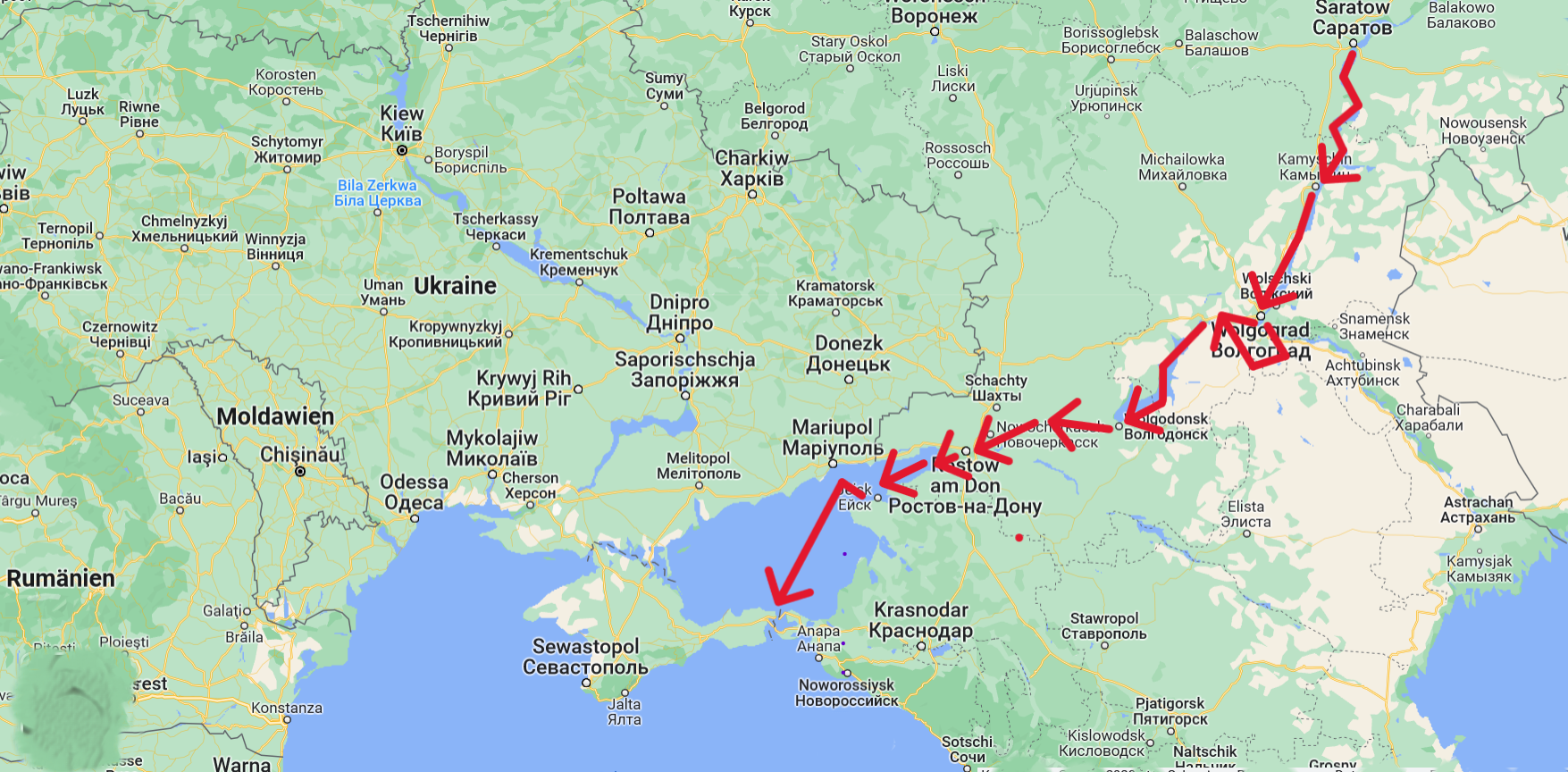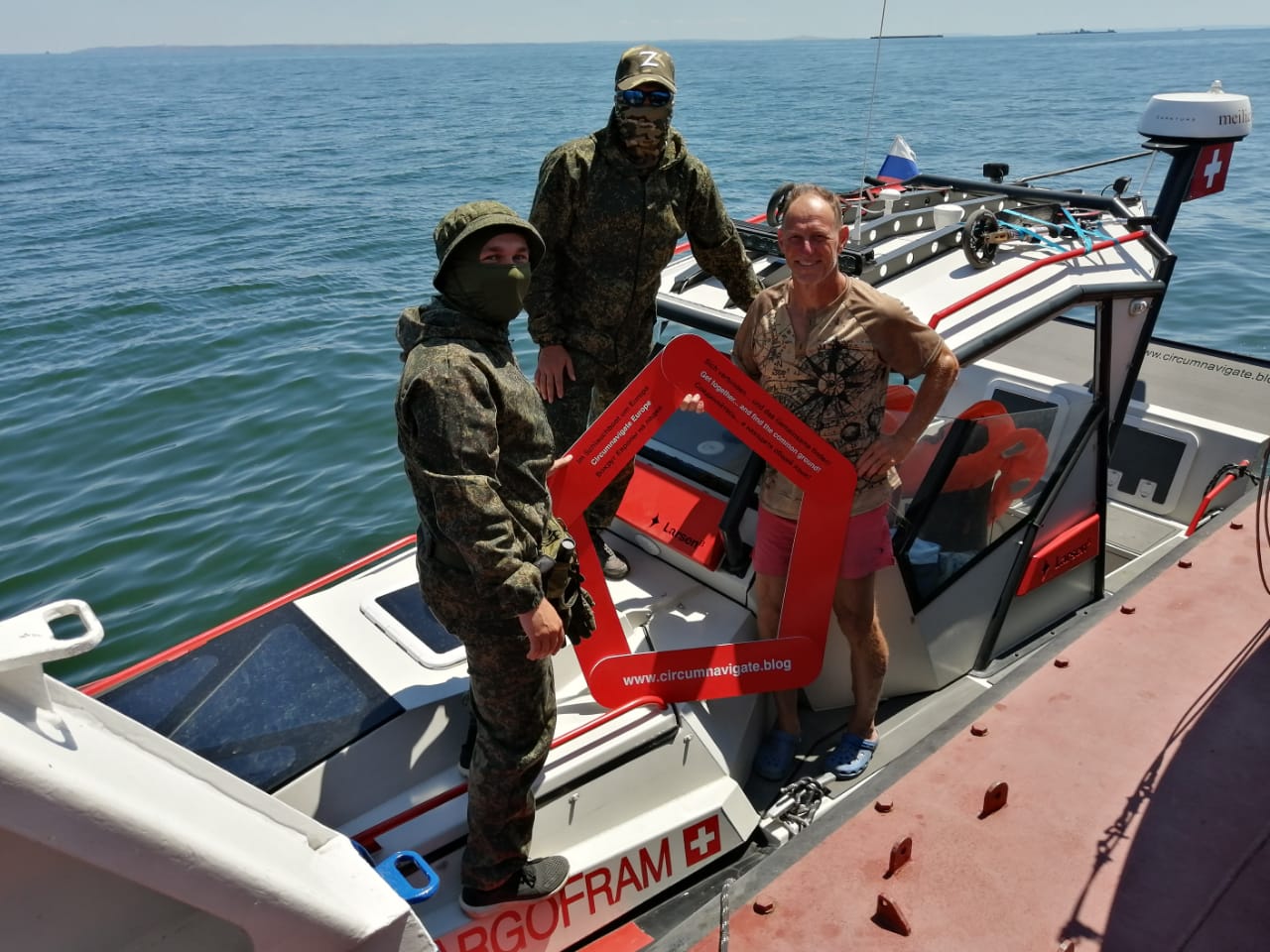Lena is tough! – Barely back on her feet (and with a fresh splint on her forearm), she wants to continue the journey with the ArgoFram. The weather and conditions in the Sea of Azov are excellent… let’s go. Passing Mariupol again, rounding the last sandbanks of Tangarog Bay and out into the open sea, we enjoy a few hours of fast sailing until all our instruments fail! No more GPS. No orientation on the electronic maps, blind in bright weather. But then a voice comes over the radio and guides us to the city of Kerch in Crimea, close to the bridge that the Ukrainians would so much like to blow up. This is followed by endless manoeuvring in this strait between countless freighters waiting to be cleared, ferries and various ports and landing stages. Until we are told to drop anchor and wait.
It looks as if we won’t be able to enter Kerch – luckily, I filled up in Azov (so we could make it to Anapa on the Black Sea without docking). Jammer and other electronic warfare devices are clearly blocking our satellite connection. Since my practical exam, I have never again determined my course manually… Now I get to navigate again with a compass, speedometer and stopwatch – and with the help of the radio, which is leading us around in the unknown. Finally, the order comes: spend the night outside the coast, 100 metres from the harbour… We drop two anchors and hope the wind doesn’t change direction.
The next day: the wait continues. I can understand why, but why don’t “they” search us so that everyone can relax? Don’t forget: I’m just glad to have made it this far. Despite all the warnings, the mood here in Russia is not what my friends back home would have me believe – precisely because there is no official war (but rather a ‘special operation’ – an extremely deadly one, it must be said), normal nautical rules apply and I have free passage. But I also sense that the responsible authorities are trying to perform a huge balancing act between routine and this special situation.
We continue to float off the coast, waiting, and whenever the radio crackles, we listen and hope for news. After noon, we are ordered back out into the Sea of Azov, to a patrol boat. The captain quickly sees that the ArgoFram is not designed for offshore overnight stays, asks how Lena is doing, gives us a few bottles of mineral water and condensed milk, and later an army “survival kit”. We now have enough calories.
I moor the ArgoFram, which now looks almost fragile, alongside the robust coastal speedboat. Lena asks if she can use the toilet – and this opens the floodgates again: the young men help her on board, Lena tells them our story, and soon we are invited to take a seat in the crew’s quarters … The cook rolls up his sleeves and prepares a tasty meal for us, and we eat and talk and answer questions. The young men are extremely interested, the captain can now assess the situation personally – and suddenly the range of options expands many times over. That’s Russia, I think. As soon as it becomes personal, hearts open up. I fetch my last bar of chocolate (fine dark cooking chocolate!) and give it to the cook with a request to use it to conjure up a dessert for the crew and enhance the meal. And that’s how I get my photograph: two young crew members, let’s call them Evgeny and Sergej, join in, come on board, cover themselves, take out their Z caps (because, after all, it’s all about victory) and pose.
It’s already dusk… Suddenly, we get clearance to leave! I don’t think twice and set off immediately – now or never. A quick, heartfelt farewell, and I’m already steering from the north past dozens of cargo ships towards the huge bridge. One freighter comes towards me, then I’ve passed this passage – and see hundreds of cargo ships, really hundreds, in the southern bay off Kerch, trying to pass through this bottleneck.

